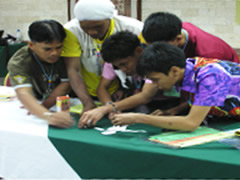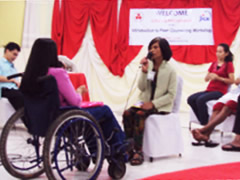Peer Counseling
Introduction to Peer Counseling Workshop
 New Lucena Participants
New Lucena Participants
The Introduction to Peer Counseling Workshop for Persons with Disabilities (PWDs) of the two (2) pioneering municipalities was held in Iloilo City and Cagayan de Oro City last November 21, 2009 to November 22, 2009 and December 7, 2009 to December 8, 2009.
Peer-Counseling for PWDs: 27 PWDs (14 for Opol and 13 for New Lucena) experienced counseling among peer-PWDs and learned the basic concepts of peer-counseling through a 3-day introductory training.
One of the purposes of the peer counseling workshop is to help the participants experience peer counseling. To help participants restore their self-confidence, rebuild human relationship, be agent of social change in their community.
 Opol Participants
Opol Participants
- Thru Peer Counseling, PWDs will know themselves and will have better understanding of their disability and their situation. Then, they will begin to rethink about their situation, and begin to empower themselves by deciding and doing what they really want in their life.
- PWDs with the same background can easily support each other, that is the significance of Peer Counseling in an IL movement.
- Peer-Counseling is a process of sharing with each other their problem, their difficulties with their disability, their difficulties with their present condition or situation.
The backbone of Peer Counseling is co-counseling which employs reassessment counseling methods. "Co" means exchange and cooperation. Hence, peer counseling is an exchange and cooperation of each other as friends or colleagues with the same background.
The peer counseling is being conducted exclusively by PWDs?
- To be free from oppression
- To be free from dependence
- To know that PWDs can support each other.
Counselor and client listen to each other one at a time, with equal amount of allotted time. The counselor and client change their role after the allotted time has lapsed. This way, each will have an equal time of each role they perform.
The Peer counseling has been strategically chosen and introduced in order to promote internal empowerment of PWDs and their participation in the NHE Project. Being one of the key elements of the Independent Living (IL) movement, peer counseling is able to liberate PWDs with positive acceptance of self and his/her disability through a series of attentive listening by other PWDs, who are trained as "counselors" as well as "peers" experiencing different types of social discrimination and exclusion.
Participants learned how to discharge their emotions and can openly talk about their feelings of joy, depression, and bewilderment on how they will accept freely the present situation they are in.
This activity helps them realize their own potential that is so vital in capacity development/empowerment of PWDs.
Follow-Up Peer Counseling Workshop in New Lucena and Opol
- Follow up Peer Counseling Workshop in New Lucena
- a. December 5, 2010
- b. TESDA Training Center, New Lucena
- Follow up Peer Counseling Workshop in Opol
- a. January 25, 2010
- b. Opol, Misamis Oriental
- Follow-up Peer counseling Workshop
A Follow-up Peer Counseling Workshop was held few months later for the PWDs in the two (2) pioneering municipalities who attended the Introduction to Peer-Counseling Workshop. The reason for this is to review the basic peer counseling basic principles and keep the momentum to uplift the participants self confidence.
Other Activities done were as follows:
- Peer support group for PWDs and parents of PWDs in Opol (Total Participants: thirty two (32): the same participants as the DET seminar on 02/07/2010)
- Peer support group (Follow-up of the peer support on 02/07/2010) for PWDs and parents of PWDs in Opol (Total Participants: thirty two (32): the same participants as the DET seminar on 02/19/2010)
- About JICA
- News & Features
- Countries & Regions
- Our Work
- Thematic Issues
- Types of Assistance
- Partnerships with Other Development Partners
- Climate Change / Environmental and Social Considerations
- Evaluations
- Compliance and Anti-corruption
- Science and Technology Cooperation on Global Issues
- Research
- JICA Development Studies Program / JICA Chair
- Support for the Acceptance of Foreign HRs / Multicultural and Inclusive Community
- Publications
- Investor Relations
